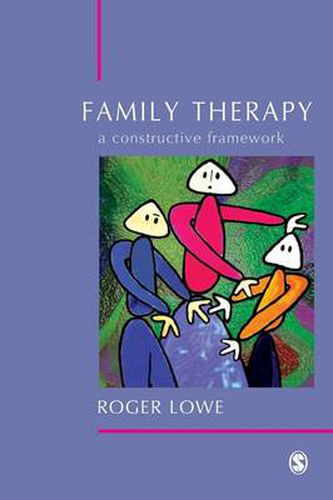Readings Newsletter
Become a Readings Member to make your shopping experience even easier.
Sign in or sign up for free!
You’re not far away from qualifying for FREE standard shipping within Australia
You’ve qualified for FREE standard shipping within Australia
The cart is loading…






Family Therapy introduces practitioners to the principles of using a constructive approach with families. Unlike more traditional approaches to family therapy, the focus is on creating an atmosphere of safety, inclusion and reflection in the therapy room, and avoiding the tensions and conflict which often characterize family therapy sessions. Setting out a clear framework for practice, Roger Lowe describes the key tasks for the therapis in: hosting meetings; negotiating concerns, and; evoking client’s preferences, goals and competencies. Exploring the idea of the therapist’s ‘inner conversation’ which takes during a session, the author shows how this can be used as a tool to overcome obstacles to the therapeutic process. Throughout the book, case studies are used to show how the constructive framework is used in practice and to highlight the range of challenging situations which are encountered during family therapy. Although often assumed to only suited to brief interventions, the book also describes ways of working constructively over a longer period of time. Roger Lowe’s book provides a refreshingly different approach to working with families, which chimes with the growing inter
$9.00 standard shipping within Australia
FREE standard shipping within Australia for orders over $100.00
Express & International shipping calculated at checkout
Family Therapy introduces practitioners to the principles of using a constructive approach with families. Unlike more traditional approaches to family therapy, the focus is on creating an atmosphere of safety, inclusion and reflection in the therapy room, and avoiding the tensions and conflict which often characterize family therapy sessions. Setting out a clear framework for practice, Roger Lowe describes the key tasks for the therapis in: hosting meetings; negotiating concerns, and; evoking client’s preferences, goals and competencies. Exploring the idea of the therapist’s ‘inner conversation’ which takes during a session, the author shows how this can be used as a tool to overcome obstacles to the therapeutic process. Throughout the book, case studies are used to show how the constructive framework is used in practice and to highlight the range of challenging situations which are encountered during family therapy. Although often assumed to only suited to brief interventions, the book also describes ways of working constructively over a longer period of time. Roger Lowe’s book provides a refreshingly different approach to working with families, which chimes with the growing inter